National
WHAT A YEAR!
Our picks for the top national and international stories of 2013

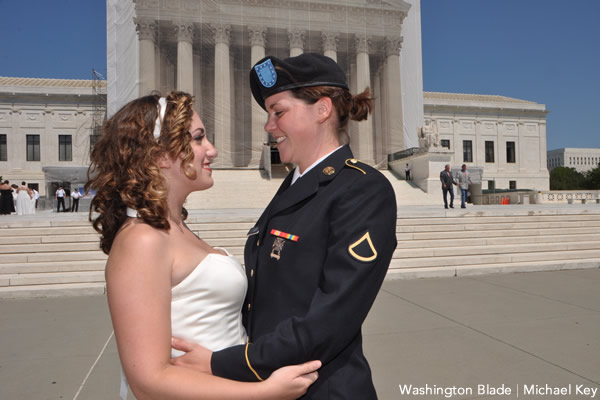
(Washington Blade file photo by Michael Key)
It was perhaps the biggest year yet for the LGBT rights movement in the United States, as the Supreme Court made history by striking down Prop 8 and part of the Defense of Marriage Act. More states legalized marriage in its wake. Elsewhere in the world, the Catholic Church got a new pope who seemed to break with his predecessor over gay rights, among other issues.
Here are the Blade staff’s picks for the year’s top 10 national and international stories.
#1 Supreme Court strikes down DOMA, Prop 8
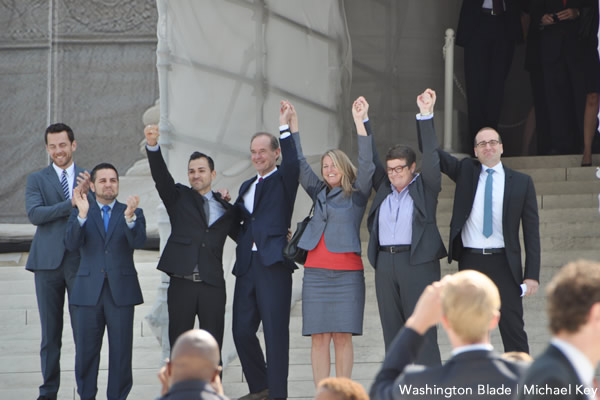
The plaintiffs in the Proposition 8 case at the Supreme Court emerge victorious with lawyer David Boies, Human Rights Campaign President Chad Griffin and American Foundation for Equal Rights Executive Director Adam Umhoefer. (Washington Blade file photo by Michael Key)
The U.S. Supreme Court issued a pair of historic decisions against the Defense of Marriage Act and California’s Proposition 8 in a news event we have dubbed the story of the year.
In a 5-4 decision, the court struck down Section 3 of DOMA, the 1996 Clinton-era law that prohibited the federal government from recognizing same-sex marriage. In a separate 5-4 decision issued at the same time, the court ruled the proponents of Prop 8 couldn’t defend the initiative in court, allowing a district court ruling to stand that determined the 2008 amendment was unconstitutional.
Writing for the majority in the decision against DOMA, U.S. Associate Justice Anthony Kennedy emphasized the harm the anti-gay law causes married same-sex couples.
“The federal statute is invalid, for no legitimate purpose overcomes the purpose and effect to disparage and to injure those whom the State, by its marriage laws, sought to protect in personhood and dignity,” Kennedy wrote. “By seeking to displace this protection and treating those persons as living in marriages less respected than others, the federal statute is in violation of the Fifth Amendment.”
The DOMA lawsuit was brought by New York widow Edith Windsor as a result of having to pay $363,000 in estate taxes in 2009 upon the death of her spouse, Thea Spyer. Windsor became a symbol of the marriage equality movement and was named by Time magazine as its No. 3 pick for “Person of the Year” after her victory at the Supreme Court.
The ruling against Prop 8 restored marriage equality to California. Thousands of same-sex couples — beginning with plaintiffs Kris Perry and Sandra Stier, who were wed by California Attorney General Kamala Harris at San Francisco City Hall — began to marry after the U.S. Ninth Circuit Court of Appeals gave the go-ahead weeks after the decision.
Immediately after the ruling against DOMA, the Obama administration pledged to work toward implementing the decision to allow for the recognition of same-sex marriage by the federal government. At a news conference during a trip to Africa, President Obama pledged to make the federal benefits of marriage as widely available as possible.
“It’s my personal belief — but I’m speaking now as a president as opposed to as a lawyer — that if you’ve been married in Massachusetts and you move someplace else, you’re still married, and that under federal law you should be able to obtain the benefits of any lawfully married couple,” Obama said.
Then-Secretary of Homeland Security Janet Napolitano issued guidance saying bi-national same-sex couples would be able to apply for marriage-based green cards to enable them to stay in the United States. The U.S. Office of Personnel Management announced that spousal benefits, including health and pension benefits, would begin to flow to gay federal employees. Perhaps most significantly, the Internal Revenue Service announced it would recognize the marriages of same-sex couples for tax purposes — even if they file tax returns while living in a non-marriage equality state.
Defense Secretary Chuck Hagel also announced that service members in same-sex marriages would be able to receive spousal benefits, including health, pension and housing benefits. Several national guards with state constitutional amendments banning same-sex marriage said they would be unable to process these benefits, but after a second edict from Hagel saying they must comply, each of those states fell in line.
Within a few short months, the ruling against DOMA also helped accelerate the path toward marriage equality throughout individual states. In Ohio, a federal judge recognized the marriage of a same-sex couple that married at BWI airport because one of the partners in the relationship was dying of Lou Gehrig’s disease. Later, a New Jersey superior court ruled the state’s civil union law was insufficient — a decision the State Supreme Court let stand upon appeal from New Jersey Gov. Chris Christie, who later the dropped the lawsuit.
Doug NeJaime, a gay law professor at the University of California, Irvine, said this movement so soon after the Windsor ruling “was anticipated” given the language that Associate Justice Anthony Kennedy used in his opinion.
“Given the flurry of activity, and the quick decisions coming out of places like Ohio, this may mean that the Supreme Court may not be able to avoid the question regarding the constitutionality of state marriage bans as long as some of the justices may hope,” NeJaime said.
#2 States, countries extend marriage rights
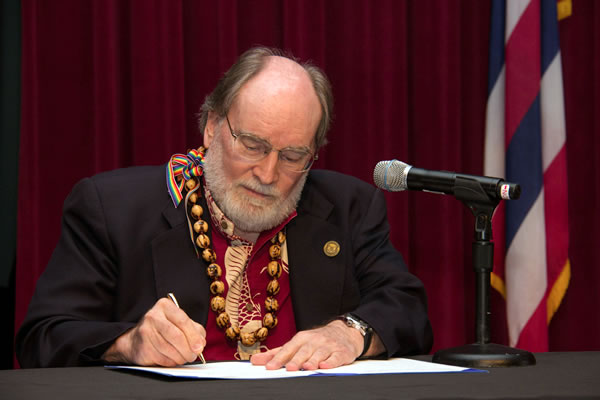
Hawaii Gov. Neil Abercrombie on Nov. 13, 2013, signed his state’s same-sex marriage bill into law. (Photo courtesy of State of Hawaii/Office of the Governor)
The movement for marriage rights for same-sex couples made significant advances in the U.S. and around the world in 2013.
In addition to Maryland and Delaware, gays and lesbians began to legally marry in California, Rhode Island, New Jersey, Minnesota and Hawaii. Illinois’s same-sex marriage law that Gov. Pat Quinn signed last month will take effect in June.
New Zealand and Uruguay also extended marriage rights to same-sex couples in 2013.
Brazil’s National Council of Justice in May nearly unanimously ruled that registrars in the South American country cannot deny marriage licenses to same-sex couples.
Gays and lesbians in England and Wales on March 29 will begin to exchange vows after the British Parliament over the summer approved a same-sex marriage bill. An identical measure cleared its first hurdle in the Scottish Parliament last month.
The legal process to extend marriage rights to same-sex couples in Mexico continued to gain ground in Baja California, Guanajuato, Jalisco and other states in 2013. A handful of gays and lesbians have exchanged vows in Colombia, but the country’s attorney general has challenged some of them.
Croatian voters on Dec. 1 approved a constitutional amendment that defines marriage as between a man and a woman. The Australia High Court on Dec. 11 ruled a law that extended marriage rights to same-sex couples in the country’s capital is unconstitutional.
#3 Senate passes ENDA; House version stalls
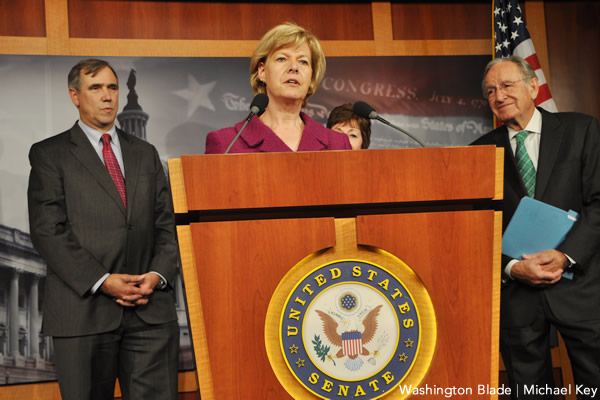
Sen. Tammy Baldwin (D-Wis.) spoke in a press conference following the passage of the Employment Non-Discrimination Act in the U.S. Senate. (Washington Blade photo by Michael Key).
For the first time in history, the U.S. Senate approved with bipartisan support this year a long sought piece of legislation that would bar employers from discriminating against or firing workers based on their sexual orientation or gender identity.
By a vote of 64-32, the Employment Non-Discrimination Act passed the Senate, marking the first time that either chamber of Congress has passed a version of the bill with protections for transgender workers. A total of 10 Republicans joined the entire Democratic caucus present in voting for the bill.
Prior to the vote, Sen. Jeff Merkley (D-Ore.), ENDA’s chief sponsor, delivered a speech on the Senate floor recognizing the historic nature of the moment.
“I look forward to this vote, this vote for liberty, this vote for freedom, this vote for opportunity, this vote for a fair and just America,” Merkley said.
Despite a push to bring up the legislation in the House, momentum on ENDA seems to have stalled as the legislation has capped out at 201 sponsors and House Speaker John Boehner (R-Ohio) has continually said he opposes it.
“I understand people have differing opinions on this issue, and I respect those opinions,” Boehner said in response to a question from the Washington Blade. “But as someone who’s worked in the employment law area for all my years in the State House and all my years here, I see no basis or no need for this legislation.”
#4 Russia’s LGBT crackdown sparks outrage
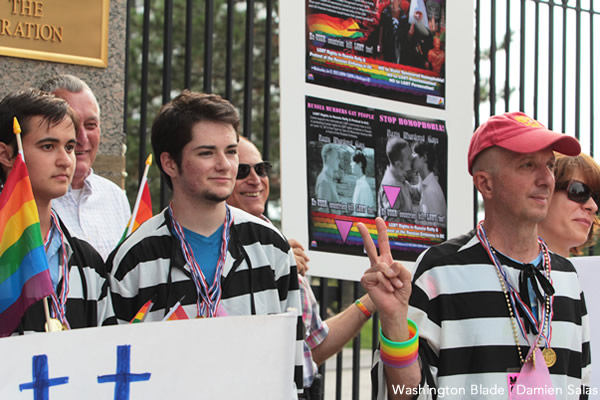
Activists protested in front of the Russian embassy several times throughout the year following the passage of anti-gay laws in the country. (Washington Blade photo by Damien Salas)
The Kremlin’s LGBT rights crackdown sparked widespread outrage this past year amid preparations for the 2014 Winter Olympics that will take place in Sochi, Russia, in February.
Russian President Vladimir Putin in June signed a broadly worded bill into law that bans gay propaganda to minors. A second statute that bans foreign same-sex couples and any couple from a country in which gays and lesbians can marry from adopting Russian children took effect in July.
LGBT rights groups and other organizations that receive funding from outside Russia could face a fine if they don’t register as a “foreign agent.”
“These laws are aimed at driving LGBT people back into silence, back underground, back to the invisibility,” Polina Andrianova of Coming Out, a St. Petersburg-based LGBT advocacy group, told the Washington Blade during an August interview.
Playwright Harvey Fierstein is among those who have called for a boycott of the Sochi games in response to Russia’s LGBT rights crackdown. The International Olympic Committee and the U.S. Olympic Committee have also faced criticism from those who feel they have not done enough to publicly criticize the Kremlin over the gay propaganda law.
“The U.S. Olympic Committee has been complicit in this act of aggression because they say we respect Russia’s right to do this,” U.S. Rep. Ileana Ros-Lehtinen (R-Fla.) told the Washington Blade in late September before the USOC added sexual orientation to its anti-discrimination policy. “That is not worthy of Olympic standards.”
Retired Olympic diver Greg Louganis on Dec. 13 told the Blade that gay MSNBC anchor Thomas Roberts should not have co-hosted the Miss Universe 2013 pageant in November in Moscow. The four-time gold medalist also said gay singer Elton John should not have performed in Russia earlier this month.
“It just seems like all they’re doing is lending credibility to what’s going on there,” said Louganis.
#5 LGBT Catholics welcome Pope Francis

‘If a person is gay and seeks the Lord and is of good will, who am I to judge him,’ said Pope Francis. (Photo by Agência Brasil; courtesy Wikimedia Commons)
LGBT Catholics in 2013 welcomed Pope Francis’ more moderate tone toward gays.
The College of Cardinals on March 16 elected the former archbishop of Buenos Aires to succeed Pope Benedict XVI who abruptly resigned in February.
The Argentine pontiff said during a September interview with an Italian Jesuit newspaper that the Roman Catholic church has grown “obsessed” with nuptials for gays and lesbians, abortion and contraception. These comments came roughly two months after he told reporters as he returned to Rome after a weeklong trip to Brazil that gays and lesbians should not be judged or marginalized.
“If a person is gay and seeks the Lord and is of good will, who am I to judge him?” said Francis in response to a question about gay priests.
LGBT rights advocates in Argentina noted to the Washington Blade the pontiff categorized the same-sex marriage bill the country’s president, Cristina Fernández de Kirchner, signed in 2010 as “the work of the devil” that would “spark God’s war.”
Dignity USA Executive Director Marianne Duddy-Burke acknowledged Francis’ anti-LGBT statements after his election. She remains optimistic the new pontiff will welcome LGBT Catholics back into the church.
“We find much to be hopeful about, particularly in the Pope’s firm desire that the church be a ‘home for all people,’ and his belief that God looks on lesbian, gay, bisexual and transgender people with love rather than condemnation,” said Duddy-Burke in a September statement.
#6 Obama names gay ambassadors, judges
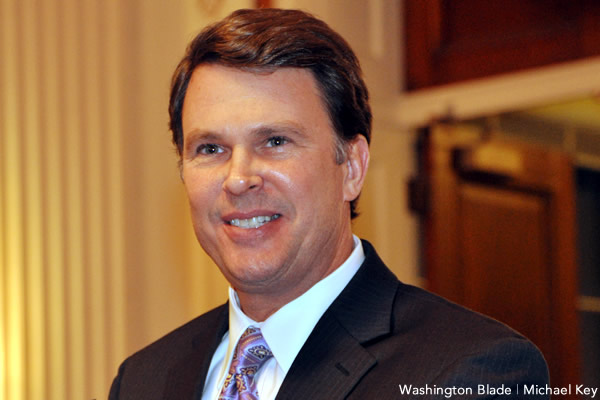
John Berry was named U.S. Ambassador to Australia. (Washington Blade file photo by Michael Key)
The U.S. Senate approved this year several openly gay appointees — including the first openly gay federal appeals judge — in confirmations that were historic both in number and significance.
Among the confirmed appointees were five openly gay ambassadors, including former U.S. Office of Personnel Management Director John Berry as U.S. ambassador to Australia. The confirmation made him the first openly gay U.S. ambassador to a G-20 country.
Also among the gay confirmations were Daniel Baer as U.S. ambassador to Organization for Security & Cooperation in Europe; Rufus Gifford as U.S. ambassador to Denmark; James Costos as U.S. ambassador to Spain; and James “Wally” Brewster as U.S. ambassador to the Dominican Republic.
Additionally, the Senate confirmed Eric Fanning as under secretary of the Air Force. After the departure of his immediate boss shortly after the confirmation, Fanning became acting secretary of the Air Force, making him the highest-ranking openly gay civilian in the U.S. military.
Chai Feldblum, the lesbian member of the U.S. Equal Employment Opportunity Commission, was confirmed for a second term after leading the way for a ruling instituting transgender workplace non-discrimination protections.
The Senate also confirmed openly gay judicial nominees. The highest-ranking among them was Todd Hughes, who was confirmed as circuit judge for the U.S. Court of Appeals for the Federal Circuit. He’s the first openly gay person to serve a federal appeals court.
The other confirmations were Pamela Ki Mai Chen as U.S. District Judge for the Eastern District of New York; Michael McShane as U.S. District Judge for the District of Oregon; and Nitza Quiñones Alejandro as U.S. District Judge for the Eastern District of Pennsylvania.
#7 Trans protections recognized under Title IX
The Obama administration made a historic ruling for transgender rights this year by applying existing law to protect students in school on the basis of their gender identity.
The Departments of Education and Justice announced the resolution as a result of a complaint filed by the National Center for Lesbian Rights on behalf of a transgender student in California’s Arcadia Unified School District. The resolution requires the school district to treat the student as male in all respects and keep his transgender status private.
NCLR Staff Attorney Asaf Orr commended the Obama administration for taking the step “to ensure that schools are safe and supportive environments where all students can thrive, including transgender students.”
The resolution represents a growing legal and administrative trend to interpret existing law — in this case, Title IX of the Education Act of 1972 — to ban discrimination against trans people.
Prior to the ruling, the student was required to sleep in a cabin by himself on an overnight field trip instead of being allowed to room with his male peers. The school district also excluded the student from the boys’ restroom and locker room, insisting that he use the nurse’s office.
The student, who remained anonymous, said he’s glad his school district agreed to put in place the resolution proposed by the Obama administration.
“Knowing that I have the school district’s support, I can focus on learning and being a typical high school student, like my friends,” the student said.
#8 Obama references Stonewall in inaugural speech
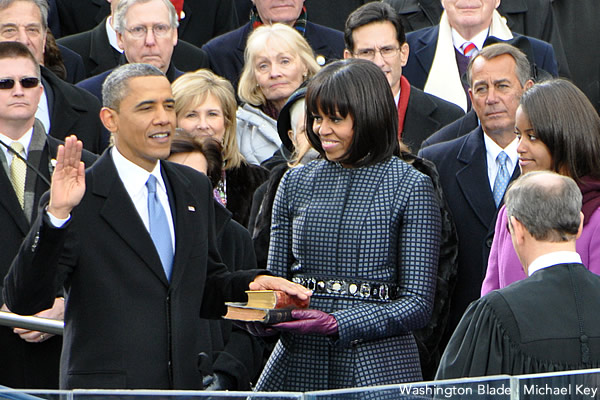
In a first, President Obama made two references to gay rights during his inaugural address in January. (Washington Blade file photo by Michael Key)
President Obama stirred passions in the LGBT community by making an unprecedented reference to LGBT rights during his second-term inaugural address and saying he believes gay people deserve equal treatment under the law.
“Our journey is not complete until our gay brothers and sisters are treated like anyone else under the law – for if we are truly created equal, then surely the love we commit to one another must be equal as well,” Obama said.
The words marked the first time that any U.S. president mentioned gay rights during an inaugural address and sent shockwaves through the LGBT community.
Also during the speech, Obama made a reference to the 1969 Stonewall riots, which are considered the start of the modern LGBT rights movement.
“We, the people, declare today that the most evident of truths – that all of us are created equal – is the star that guides us still; just as it guided our forebears through Seneca Falls, and Selma, and Stonewall; just as it guided all those men and women, sung and unsung, who left footprints along this great Mall, to hear a preacher say that we cannot walk alone; to hear a King proclaim that our individual freedom is inextricably bound to the freedom of every soul on Earth,” Obama said.
#9: Gay mayors in Seattle, Houston; Quinn loses in New York
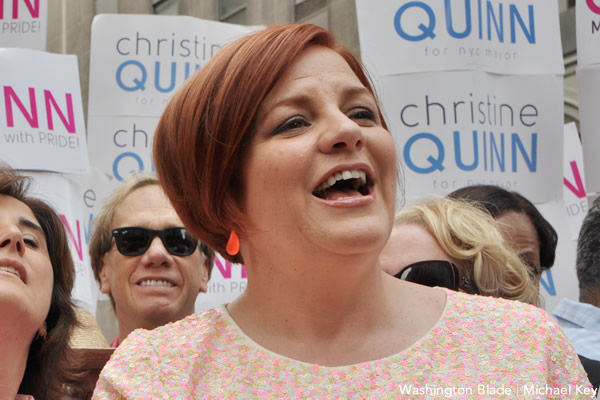
Lesbian Christine Quinn started her mayoral campaign a heavy favorite but ultimately lost in New York’s primary. (Washington Blade photo by Michael Key)
Lesbian Annise Parker won election to her third and final term as mayor of Houston, on Nov. 5, receiving a decisive 57 percent of the vote in a nine-candidate race.
In Seattle, Washington State Sen. Ed Murray defeated incumbent Mayor Mike McGinn by a margin of 56 percent to 43 percent to become that city’s first openly gay mayor.
And in Atlantic City, N.J., gay Republican Don Guardian shook up the political establishment by winning an upset victory over incumbent Mayor Lorenzo Langford, a Democrat, in a city where Democrats outnumber Republicans among registered voters by a nine to one margin. Guardian ran as a socially progressive reform candidate with a record as a highly competent administrator of services for the city’s tourist district.
Meanwhile, New York City Council Speaker Christine Quinn lost her race to become New York’s first openly gay and first female mayor, finishing third in a hotly contested Democratic primary in September. A New York Times exit poll showed pro-LGBT candidate Bill deBlasio, who won the primary and the general election in November, beat Quinn among LGBT voters by a margin of 47 percent to 34 percent in a four candidate race.
Most political observers said LGBT voters joined the majority of their straight counterparts in backing deBlasio, who emerged as more progressive on economic issues than Quinn and who was perceived as an outspoken critic of incumbent Mayor Michael Bloomberg, who is highly unpopular among Democratic voters. Quinn had long been viewed as a Bloomberg ally.
# 10 Manning gets 35 years, comes out as trans

Manning announced she is transitioning one day after being sentenced for leaking classified documents. (Public domain photo)
One day after a military judge sentenced former U.S. Army Private Bradley Manning to 35 years in prison for leaking classified documents to Wikileaks, the 25-year-old soldier released a statement through her attorney coming out as transgender.
“As I transition into this next phase of my life, I want everyone to know the real me,” Manning said. “I am Chelsea Manning. I am a female.”
Manning’s dramatic announcement shifted the media focus from that of her conviction in an Army court martial proceeding of violating the U.S. Espionage Act for leaking an unprecedented amount of classified information to the issue of who transgender people are and whether they should be entitled to equal rights.
Some transgender rights advocates said Manning’s case would hurt efforts to lift the military’s ban on transgender service members by casting transgender people in a negative light. Transgender activists Brynn Tannehill and Autumn Sandeen, who served in the military before transitioning, said they were especially troubled by arguments by Manning’s attorney that Manning’s struggle over her gender identity created stress that played some role in her decision to leak classified information.
“In my last four years in the Navy I was grappling with gender identity yet I did my job” and didn’t release classified information,” Sandeen said.
By Lou Chibbaro Jr., Chris Johnson and Michael Lavers

The Comings & Goings column is about sharing the professional successes of our community. We want to recognize those landing new jobs, new clients for their business, joining boards of organizations and other achievements. Please share your successes with us at [email protected].
Congratulations to Gil Pontes III on his recent appointment to the Financial Advisory Board for the City of Wilton Manors, Fla. Upon being appointed he said, “I’m honored to join the Financial Advisory Board for the City of Wilton Manors at such an important moment for our community. In my role as Executive Director of the NextGen Chamber of Commerce, I spend much of my time focused on economic growth, fiscal sustainability, and the long-term competitiveness of emerging business leaders. I look forward to bringing that perspective to Wilton Manors — helping ensure responsible stewardship of public resources while supporting a vibrant, inclusive local economy.”
Pontes is a nonprofit executive with years of development, operations, budget, management, and strategic planning experience in 501(c)(3), 501(c)(4), and political organizations. Pontes is currently executive director of NextGen, Chamber of Commerce. NextGen Chamber’s mission is to “empower emerging business leaders by generating insights, encouraging engagement, and nurturing leadership development to shape the future economy.” Prior to that he served as managing director of The Nora Project, and director of development also at The Nora Project. He has held a number of other positions including Major Gifts Officer, Thundermist Health Center, and has worked in both real estate and banking including as Business Solutions Adviser, Ironwood Financial. For three years he was a Selectman, Town of Berkley, Mass. In that role, he managed HR and general governance for town government. There were 200+ staff and 6,500 constituents. He balanced a $20,000,000 budget annually, established an Economic Development Committee, and hired the first town administrator.
Pontes earned his bachelor’s degree in political science from the University of Massachusetts, Dartmouth.
Kansas
ACLU sues Kansas over law invalidating trans residents’ IDs
A new Kansas bill requires transgender residents to have their driver’s licenses reflect their sex assigned at birth, invalidating current licenses.

Transgender people across Kansas received letters in the mail on Wednesday demanding the immediate surrender of their driver’s licenses following passage of one of the harshest transgender bathroom bans in the nation. Now the American Civil Liberties Union is filing a lawsuit to block the ban and protect transgender residents from what advocates describe as “sweeping” and “punitive” consequences.
Independent journalist Erin Reed broke the story Wednesday after lawmakers approved House Substitute for Senate Bill 244. In her reporting, Reed included a photo of the letter sent to transgender Kansans, requiring them to obtain a driver’s license that reflects their sex assigned at birth rather than the gender with which they identify.
According to the reporting, transgender Kansans must surrender their driver’s licenses and that their current credentials — regardless of expiration date — will be considered invalid upon the law’s publication. The move effectively nullifies previously issued identification documents, creating immediate uncertainty for those impacted.
House Substitute for Senate Bill 244 also stipulates that any transgender person caught driving without a valid license could face a class B misdemeanor, punishable by up to six months in jail and a $1,000 fine. That potential penalty adds a criminal dimension to what began as an administrative action. It also compounds the legal risks for transgender Kansans, as the state already requires county jails to house inmates according to sex assigned at birth — a policy that advocates say can place transgender detainees at heightened risk.
Beyond identification issues, SB 244 not only bans transgender people from using restrooms that match their gender identity in government buildings — including libraries, courthouses, state parks, hospitals, and interstate rest stops — with the possibility for criminal penalties, but also allows for what critics have described as a “bathroom bounty hunter” provision. The measure permits anyone who encounters a transgender person in a restroom — including potentially in private businesses — to sue them for large sums of money, dramatically expanding the scope of enforcement beyond government authorities.
The lawsuit challenging SB 244 was filed today in the District Court of Douglas County on behalf of anonymous plaintiffs Daniel Doe and Matthew Moe by the American Civil Liberties Union, the ACLU of Kansas, and Ballard Spahr LLP. The complaint argues that SB 244 violates the Kansas Constitution’s protections for personal autonomy, privacy, equality under the law, due process, and freedom of speech.
Additionally, the American Civil Liberties Union filed a temporary restraining order on behalf of the anonymous plaintiffs, arguing that the order — followed by a temporary injunction — is necessary to prevent the “irreparable harm” that would result from SB 244.
State Rep. Abi Boatman, a Wichita Democrat and the only transgender member of the Kansas Legislature, told the Kansas City Star on Wednesday that “persecution is the point.”
“This legislation is a direct attack on the dignity and humanity of transgender Kansans,” said Monica Bennett, legal director of the ACLU of Kansas. “It undermines our state’s strong constitutional protections against government overreach and persecution.”
“SB 244 is a cruel and craven threat to public safety all in the name of fostering fear, division, and paranoia,” said Harper Seldin, senior staff attorney for the ACLU’s LGBTQ & HIV Rights Project. “The invalidation of state-issued IDs threatens to out transgender people against their will every time they apply for a job, rent an apartment, or interact with police. Taken as a whole, SB 244 is a transparent attempt to deny transgender people autonomy over their own identities and push them out of public life altogether.”
“SB 244 presents a state-sanctioned attack on transgender people aimed at silencing, dehumanizing, and alienating Kansans whose gender identity does not conform to the state legislature’s preferences,” said Heather St. Clair, a Ballard Spahr litigator working on the case. “Ballard Spahr is committed to standing with the ACLU and the plaintiffs in fighting on behalf of transgender Kansans for a remedy against the injustices presented by SB 244, and is dedicated to protecting the constitutional rights jeopardized by this new law.”
National
After layoffs at Advocate, parent company acquires ‘Them’ from Conde Nast
Top editorial staff let go last week

Former staff members at the Advocate and Out magazines revealed that parent company Equalpride laid off a number of employees late last week.
Those let go included Advocate editor-in-chief Alex Cooper, Pride.com editor-in-chief Rachel Shatto, brand partnerships manager Erin Manley, community editor Marie-Adélina de la Ferriére, and Out magazine staff writers Moises Mendez and Bernardo Sim, according to a report in Hollywood Reporter.
Cooper, who joined the company in 2021, posted to social media that, “Few people have had the privilege of leading this legendary LGBTQ+ news outlet, and I’m deeply honored to have been one of them. To my team: thank you for the last four years. You’ve been the best. For those also affected today, please let me know how I can support you.”
The Advocate’s PR firm when reached by the Blade said it no longer represents the company. Emails to the Advocate went unanswered.
Equalpride on Friday announced it acquired “Them,” a digital LGBTQ outlet founded in 2017 by Conde Nast.
“Equalpride exists to elevate, celebrate and protect LGBTQ+ storytelling at scale,” Equalpride CEO Mark Berryhill said according to Hollywood Reporter. “By combining the strengths of our brands with this respected digital platform, we’re creating a unified ecosystem that delivers even more impact for our audiences, advertisers, and community partners.”
It’s not clear if “Them” staff would take over editorial responsibilities for the Advocate and Out.

















